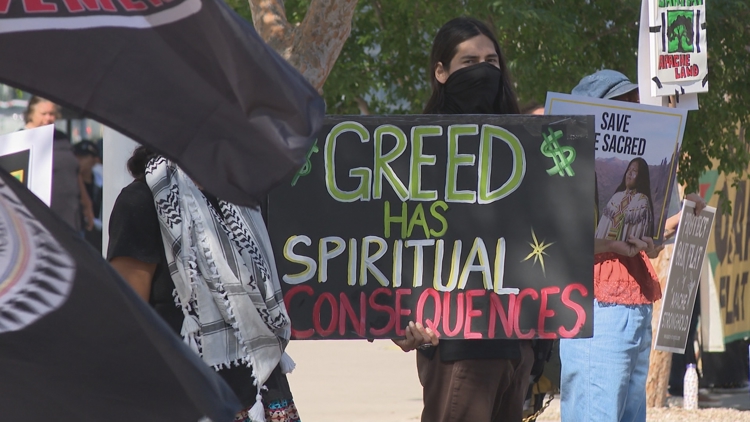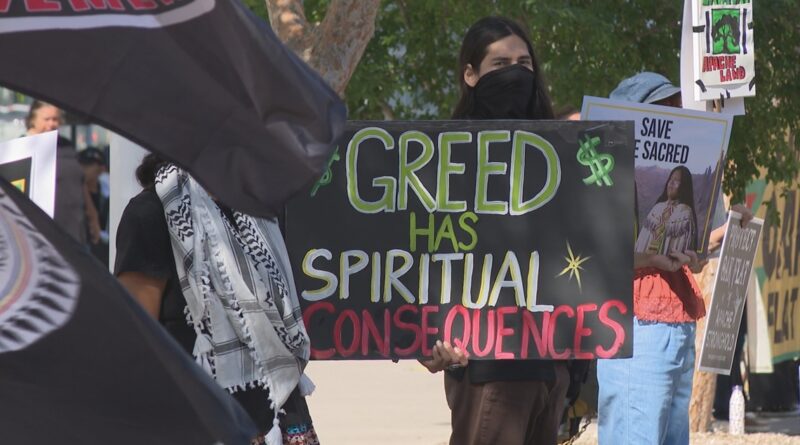Judge blocks Oak Flat land transfer amid tribal protests

A federal judge has granted a narrowed injunction on the Oak Flat land transfer to a mining company.
PHOENIX — A federal judge has temporarily blocked the transfer of Oak Flat to a mining company, while the U.S. Supreme Court continues to deliberate on whether it will hear the case at all.
In an opinion released May 9, U.S. District Judge Steven P. Logan concluded the plaintiffs in the Oak Flat lawsuit were entitled to a narrow injunction.
“It is abundantly clear that the balance of equities ‘tips sharply’ in Plaintiff’s favor, and that even in the short term, they have established a likelihood of irreparable harm should the transfer proceed,” the judge wrote. “Furthermore, they have presented serious questions on the merits that warrant the Supreme Court’s careful scrutiny, should it agree to grant cert.”
The injunction blocking the transfer shall remain in effect until the day after the Supreme Court denies review or issues a judgement, according to the judge’s ruling.
The legal battle over Oak Flat has stretched on for years. The Supreme Court has listed the case more than a dozen times for consideration but has yet to take it up.
In the meantime, the clock has been ticking—without court intervention, the land transfer was set to go through on June 16.
Outside the federal courthouse in Phoenix earlier this week, protesters gathered as attorneys for the group Apache Stronghold argued inside to stop the transfer. The group represents tribal members who consider Oak Flat a sacred site.
“We went into court today to highlight a profound injustice,” said Luke Goodrich, an attorney representing Apache Stronghold.
Oak Flat, located in the mountains east of the Valley, has been used for Apache religious ceremonies for generations. Tribal members say the land itself, not just what happens on it, is sacred.
The roots of the controversy date back to 2014, when Congress approved a land exchange: Oak Flat would be given to Resolution Copper, a company planning to mine the area, in return for other conservation land the company owns across the country.
Resolution Copper plans to extract what could be more than $180 billion worth of copper from the site based on current prices.
Apache Stronghold filed suit to stop the mine, arguing that if the land is transferred and construction begins, the site will suffer permanent, irreparable damage. And if the Supreme Court later decides to take the case and rule in their favor, it would be too late.
Resolution Copper’s president testified that the company has no plans to restrict access to Oak Flat for at least 10 years. But she also acknowledged that once underground mining begins, the ground above would subside. In Goodrich’s words, swallowing Oak Flat in a hole.
Resolution Copper issued a statement after the hearing:
“We appreciate the court’s time today. The Resolution Copper mine is vital to securing America’s energy future, infrastructure needs, and national defense with a domestic supply of copper and other critical minerals. We are encouraged by the significant community support for the project, which has the potential to become one of the largest copper mines in America, add $1 billion a year to Arizona’s economy, and create thousands of local jobs in a region where mining has played an important role for more than a century. More than a decade of extensive consultation and collaboration with Native American Tribes and local communities has directly led to major changes to the mining plan to preserve and reduce potential impacts on Tribal, social, and cultural interests, and this ongoing dialogue will continue to shape the project.”
The Department of Justice declined to comment apart from their statements in court.
Goodrich said Apache Stronghold remains committed to the fight.
“No matter the outcome, we’re doing the right thing by fighting,” he said.

